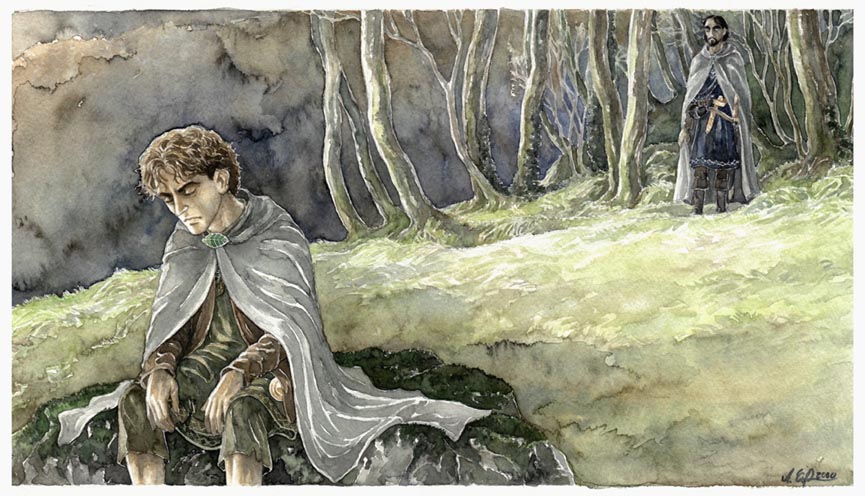The Two Towers by J.R.R Tolkien (Harper Collins 1991, 2007) pp. 826-830
An essential difference between Peter Jackson’s version of The Lord of the Rings and the story that Tolkien originally told lies in the character of Gollum and the telling of the inner debate between Gollum and Sméagol that Sam overhears.

Peter Jackson’s imagining of the debate between Sméagol and Gollum.
Sam hears it because Gollum’s inner life is almost laid bare for all to see. I say almost because Gollum is still capable of deception. Sam hears Gollum speak of She and wonders who that might be but does not find out until he encounters Shelob in her lair.
Jackson gives us the same debate that Sam overhears but with a major difference. In his version the debate is between good and evil. He gives us a sense that within the miserable creature that has guided Frodo and Sam through the Dead Marshes almost as far as the Black Gate the possibility remains that good might still triumph. Indeed at this point of the story the good Sméagol does seem to triumph over the evil Gollum and the debate ends with Sméagol crying out “I’m free! I’m free!”

“I’m Free!”
But Tolkien gives us a very different version of this debate. Here we see the same Gollum whose mind has been utterly overthrown by his desire for the Ring. When Gollum thinks about the promise that he made to Frodo to “serve the master of the Precious” all that he thinks about is that if he were to regain the Ring then he would be its master and so would have kept the promise. Sméagol, on the other hand, could never be described in any sense as good. In Tolkien’s version of the debate we see a pathetic cringing figure driven mainly by fear. Fear that there might be terrible consequences if he were to break the promise because the promise is held by the Ring and he fears the Ring above all things, and fear that in trying to take the Ring he might be killed because there are two hobbits and only one of him. Sméagol does have some sense of gratitude to Frodo who took the elven rope off his leg but his goodness goes little further than that. And the debate ends, not with Sméagol’s cry of joy that he is free of the control of the Ring and of his Gollum alter ego but with his hand slowly reaching out to seize the Ring, an action that is only prevented by Sam appearing to wake up.
The Ring and its corruption have a complete hold over all that Gollum or Sméagol are. The distinction that Sam makes between them as Slinker and Stinker is pretty accurate. But there is one sense in which Gollum has grown as a character during the long years of his existence. The Gollum who took the Ring by the murder of his friend was a creature with almost minimal ambition. Apart from a desire to hide and to survive all that drove him was a desire to find the roots of things and this desire sent him deep under the Misty Mountains where all he found was darkness.
This all changed when Bilbo took the Ring from him and he began his long search for it. As he searched he began to understand more and more about the thing that he had possessed for so many years and with which he had done practically nothing. And he learnt this most when he fell into the hands of Sauron, the Lord of the Ring. It was from Sauron that he learned about mastery, the ability to rule over others. That is why Gollum refers to Sauron as He. This leads Gollum to develop a fantasy life, one in which he is “Lord Sméagol? Gollum the Great? The Gollum!”. Gollum imagines himself as lord and ruler of all. A life in which he is able to exchange his pathetic cringing existence for one in which all will bow down to him, even the Nazgûl. But even then his ambition is very limited. All he desires with all his mastery is fish “three times a day, fresh from the Sea”.

Fish three times a day.
Last week we thought about Sauron’s desire to see everything and to control it. Gollum’s desire is not very different and like Sauron he does not so much possess his desire but is possessed by it. He would not be the Lord of the Ring so much as to be ruled by it. And is Sauron so very different?














